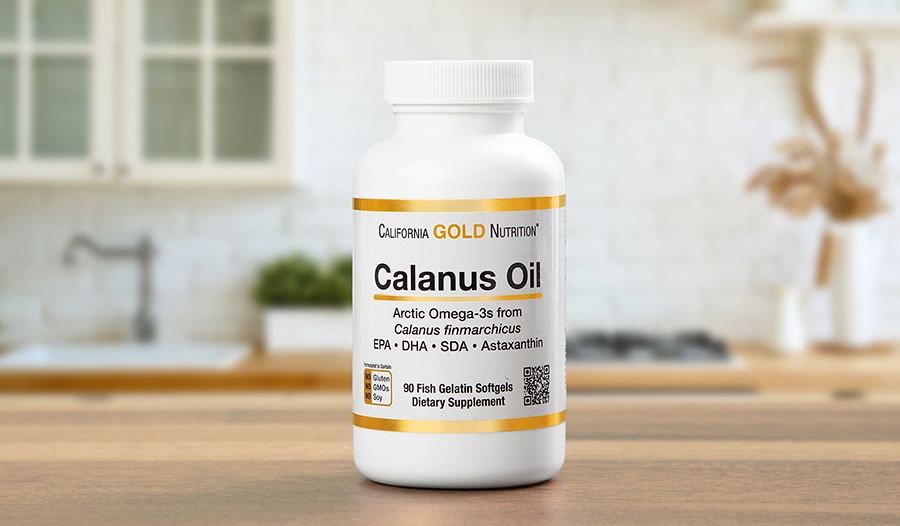What Is Calanus Oil? Here are 5 Health Benefits

What Is Calanus Oil? What Makes it Different?
Omega 3 fatty acids like eicosapentaenoic acid (EPA) and docosahexaenoic acid (DHA) have increased in popularity among those interested in living healthier lifestyles.
This increased demand for high-quality omega-3 fatty acids has led to the availability of more varied sources of omega-3s like krill oil, cod liver oil, and even vegan sources like flax seed oil and chia seeds.
With all the different options available for omega-3s, you may think that you've heard them all, but have you ever heard of Calanus oil?
Calanus oil is a natural oil obtained from a special type of zooplankton, Calanus finmarchicus, a copepod. Copepods are tiny marine crustaceans found in large quantities in the North Atlantic Ocean. Calanus oil has a distinctive red color caused by a fat-soluble red-orange carotenoid pigment called astaxanthin, commonly found in marine life.
This red-color oil is rich with omega-3 fatty acids but in a particular way. Instead of the more conventional triglyceride and phospholipid forms of long-chain polyunsaturated fatty acids (PUFAs) found in fish oils, the omega-3 fatty acids found in Calanus oil come in the form of wax esters. This trait causes Calanus oil to have a unique chemical composition compared to traditional polyunsaturated fat-rich oils like fish oil or krill oil.
The unique composition of the wax-ester long-chain polyunsaturated fatty acids in Calanus oil may also play a role in some potential health benefits unique to the oil itself. These benefits may include improved liver function, cardiovascular function, reduced inflammation, reduced obesity, and improved brain function.
Improved Liver Health
The liver is an organ in the body responsible for different functions, including:
- Production of proteins for blood plasma
- Production of bile for the breakdown of fats
- Helping to metabolize and clear the bloodstream of medications
- Maintaining proper blood glucose levels in the body by converting excess glucose into glycogen stored for when the body needs energy.
Having a healthy functioning liver is essential to overall health.
Studies suggest that Calanus oil may improve liver function, especially for those who are diabetic or prediabetic. For example, in one study, individuals with a body mass index (BMI) over 30, indicating obesity and markers for prediabetes, were given Calanus oil for up to 16 weeks. Those who received Calanus oil had improved liver glucose regulation and less liver insulin resistance.
The results indicate that Calanus oil may help improve the body's response to insulin while keeping the blood glucose more stable. This finding was attributed to the fact that the conventional long-chain polyunsaturated fatty acids found in fish oil are usually digested quicker than the wax-ester omega-3s found in Calanus oil.
Research suggests that Calanus oil may help to improve liver health due to the high amounts of astaxanthin. For instance, one animal study showed that astaxanthin might significantly reduce scar tissue in the liver by decreasing free radical damage.
The same study showed that astaxanthin may help to reduce inflammation and the progression of nonalcoholic fatty liver disease.
Improved Cardiovascular Function
The cardiovascular system is an intricate system of blood vessels connected to the heart and helps to provide nutrients and oxygen throughout the body. An unhealthy cardiovascular system marked by disorders like high blood pressure and high cholesterol can lead to lifelong health problems like a heart attack or stroke. In short, having a healthy cardiovascular system is crucial to leading a full and healthy life.
Research suggests that Calanus oil may help to benefit the cardiovascular system. For example, high levels of angiotensin-II over long periods can lead to an increase in the size of the heart and the development of fibrous tissue in the heart, making it harder for the heart to pump and increasing blood pressure.
One animal study showed that Calanus oil supplementation helped prevent the heart's enlargement while also lessening the formation of fibrous tissue in the heart due to increased levels of angiotensin-II. The same study also found that the mice taking Calanus oil had a lower incidence of high blood pressure due to a reduction of inflammation in the blood vessel walls.
Another animal study showed that Calanus oil may have helped to reduce cholesterol levels and prevent the deposition of hard fatty plaque deposits in artery walls or atherosclerosis.
Reduced Inflammation
Inflammation results from the body's immune result to a foreign invader. While this response is necessary to rid the body of intruders, inflammation, especially long-term inflammation, has been linked to the development of several different diseases, including diabetes, heart disease, autoimmune illnesses, and even certain cancers. Inflammation is also linked to increased aging and lowered longevity.
Studies are promising when it comes to the anti-inflammatory and antiaging properties of Calanus oil. This is due to the high amount of easily absorbed omega-3 fatty acids like EPA and DHA found in Calanus oil.
For example, one study involving older women showed that those who supplemented with Calanus oil while performing an exercise routine had lowered levels of inflammation and blood markers for free radical damage. Increased free radical damage leads to more significant signs of aging.
Another study involving older women who participated in an exercise program showed that Calanus oil supplementation helped to improve functional lower body strength better than just exercise alone.
Another reason Calanus oil may have such a powerful anti-inflammatory effect may be due to the high amounts of astaxanthin the oil contains. Studies show that astaxanthin may help to inhibit the body's natural activation of inflammatory proteins, thereby reducing inflammation overall.
Weight Management
As noted above, obesity is defined as having a BMI of 30 or greater. Carrying excess weight is often linked to certain diseases and disorders, including heart disease, lung disease, diabetes, arthritis, and even certain cancers. Obesity, especially abdominal obesity, is also linked to higher amounts of bodywide or systemic inflammation.
Studies suggest that Calanus oil may also have some anti-obesity benefits in addition to its anti-inflammatory properties. For instance, one animal study showed that mice eating a high-fat diet had an alteration of their gut microbiome, the bacteria that live in the gut, in an unhealthy way that promoted inflammation leading to higher incidences of obesity. However, Calanus oil supplementation helped to prevent the overgrowth of obesity-promoting bacteria while promoting the growth of healthier gut microbiota strains like Lactobacillus even while the mice were still eating a high-fat diet.
Research also suggests that Calanus oil supplements may help to reduce obesity-linked inflammation. For example, one animal study involving obese mice showed that supplementing with Calanus oil not only reduced the production of inflammatory cytokines or cell messengers but also helped to decrease the size of adipocytes or fat cells.
Improved Brain Function
As an infant, the human brain needs large amounts of DHA, an omega-3 fatty acid, to develop and function properly. The quick uptake of large amounts of DHA by the brain happens throughout the neonatal period up until two years of life.
However, this doesn't mean adults no longer need DHA. DHA levels are actually maintained at high amounts in the brain throughout life, and low DHA levels are associated with mood disorders and cognitive decline.
One study found that higher DHA blood levels were associated with better nonverbal reasoning, vocabulary, working memory, and mental flexibility in adults aged 35-54 without neuropsychiatric disorders.
Studies also suggest that Calanus oil is high in DHA and contains a more bioavailable form of DHA as a wax ester. This means that the omega-3 fatty acids in Calanus oil may be able to be absorbed and used easier in the body than more traditional fish oils.
Furthermore, Calanus oil has EPA, plant sterols, astaxanthin, and stearidonic acid, another long-chain fatty acid with potential health benefits currently under investigation.
Takeaway
Calanus oil is a sustainable source of high potent bioavailable omega-3 fatty acids filled with powerful antioxidant and anti-inflammatory properties. Although it may come from a tiny marine creature, Calanus oil is making a big impact in the world of omega-3 fatty acid supplements. The distinctive reddish color and unique omega-3 fatty acid chemical composition make Calanus oil a supplement that's hard to ignore.
With potential health benefits ranging from improving cardiovascular health and liver function to being a powerful anti-inflammatory and a potential weight loss aid, Calanus oil may be the fish oil of the future.
References:
- Arulselvan P, Fard MT, Tan WS, et al. Role of antioxidants and natural products in inflammation. Oxid Med Cell Longev. 2016;2016:5276130. doi:10.1155/2016/5276130
- Burhop M, Schuchardt JP, Nebl J, Müller M, Lichtinghagen R, Hahn A. Marine oil from C. finmarchicus enhances glucose homeostasis and liver insulin resistance in obese prediabetic individuals. Nutrients. 2022;14(2):396. Published 2022 Jan 17. doi:10.3390/nu14020396
- Chang MX, Xiong F. Astaxanthin and its effects in inflammatory responses and inflammation-associated diseases: recent advances and future directions. Molecules. 2020;25(22):5342. Published 2020 Nov 16. doi:10.3390/molecules25225342
- Čížková T, Štěpán M, Daďová K, et al. Exercise training reduces inflammation of adipose tissue in the elderly: cross-sectional and randomized interventional trial. J Clin Endocrinol Metab. 2020;105(12):dgaa630. doi:10.1210/clinem/dgaa630
- Conway B, Rene A. Obesity as a disease: no lightweight matter. Obes Rev. 2004;5(3):145-151. doi:10.1111/j.1467-789X.2004.00144.x
- Daďová K, Petr M, Šteffl M et al. Effect of calanus oil supplementation and 16 week exercise program on selected fitness parameters in older women. Nutrients. 2020;12(2):481. doi:10.3390/nu12020481
- Gasmi A, Mujawdiya PK, Shanaida M, et al. Calanus oil in the treatment of obesity-related low-grade inflammation, insulin resistance, and atherosclerosis. Appl Microbiol Biotechnol. 2020;104(3):967-979. doi:10.1007/s00253-019-10293-4
- Höper AC, Salma W, Khalid AM, et al. oil from the marine zooplankton Calanus finmarchicus improves the cardiometabolic phenotype of diet-induced obese mice. Br J Nutr. 2013;110(12):2186-2193. doi:10.1017/S0007114513001839
- Lauritzen L, Brambilla P, Mazzocchi A, Harsløf LB, Ciappolino V, Agostoni C. DHA effects in brain development and function. Nutrients. 2016;8(1):6. Published 2016 Jan 4. doi:10.3390/nu8010006
- Li J, Guo C, Wu J. Astaxanthin in liver health and disease: a potential therapeutic agent. Drug Des Devel Ther. 2020;14:2275-2285. Published 2020 Jun 9. doi:10.2147/DDDT.S230749
- Salma W, Franekova V, Lund T, et al. Dietary calanus oil antagonizes angiotensin II-induced hypertension and tissue wasting in diet-induced obese mice. Prostaglandins Leukot Essent Fatty Acids. 2016;108:13-21. doi:10.1016/j.plefa.2016.03.006
- Schots PC, Jansen KM, Mrazek J, Pedersen AM, Olsen RL, Larsen TS. Obesity-induced alterations in the gut microbiome in female mice fed a high-fat diet are antagonized by dietary supplementation with a novel, wax ester-rich, marine oil. Nutr Res. 2020;83:94-107. doi:10.1016/j.nutres.2020.09.002
- Schots PC, Pedersen AM, Eilertsen KE, Olsen RL, Larsen TS. Possible health effects of a wax ester rich marine oil. Front Pharmacol. 2020;11:961. Published 2020 Jun 26. doi:10.3389/fphar.2020.00961
- Wasserfurth P, Nebl J, Schuchardt JP, et al. Effects of exercise combined with a healthy diet or Calanus finmarchicus oil supplementation on body composition and metabolic markers—a pilot study. Nutrients. 2020;12(7):2139. Published 2020 Jul 18. doi:10.3390/nu12072139
- Weiser MJ, Butt CM, Mohajeri MH. Docosahexaenoic acid and cognition throughout the lifespan. Nutrients. 2016;8(2):99. Published 2016 Feb 17. doi:10.3390/nu8020099
DISCLAIMER:This Wellness Hub does not intend to provide diagnosis...
















































































 Table of Contents
Table of Contents
















